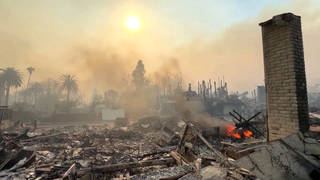
Guests
- Hans Ehrbarprofessor of economics at the University of Utah.
As Democracy Now! host Amy Goodman broadcasts from Salt Lake City, Utah, on her 100-city “Silenced Majority Tour,” we speak with Hans Ehrbar, a professor of economics at the University of Utah. He has been an outspoken proponent of confronting the climate deniers in both the United States, where there is a strong oil and coal lobby, and also in Europe, where he says “80 percent believe climate change is an issue” but “they’re not emotionally facing up to it.” [includes rush transcript]
Transcript
AMY GOODMAN: This is Democracy Now!, democracynow.org, The War and Peace Report. Arnie was speaking to us from Vermont. We’re going to be going to Red Hook in a minute to our colleague Jessica Lee. She’s our social media manager at Democracy Now! But Red Hook, where she lives, is under water, and she’s going to describe that to us. But here in the studio in Salt Lake City—yes, folks, it is quite amazing. I cannot believe I’m not in New York, where we usually are broadcasting from, but here we are outside of New York and actually able to do this broadcast, because our studios are in the dark.
Hans Ehrbar, you are a professor of economics here at the University of Utah, yet you have been talking about climate change for a long time. In fact, you’re giving a speech on it on Friday. Why?
HANS EHRBAR: Well, I happen to realize what—how—what an important issue it is. And so little is done about it. And I think one of the problems is it is such a big issue, we cannot even fathom, you know, the reality ourselves. It is not just that in the United States you can say, “Oh, there is this big lobby there. There is the oil and coal industry. They are flooding us with propaganda.” But even in Europe, people are not facing up to—even there, where 80 percent believe that climate change is an issue, but they are not emotionally facing up to it. And so, the main—the main climate change denial—denier is right inside us.
AMY GOODMAN: You talked about going to a meeting at the—here in Salt Lake City. Describe this meeting, which goes to the issue of resource and denial.
HANS EHRBAR: Yeah, that was—that was a meeting of an institute called Clean and Secure Energy. And basically that is the unconventional fuels, which—which are in line to replace the easy oil and gas. And those people have enough knowledge that they know how much damage they do with their—with their business, and they are still doing it. And I was kind of going there as a researcher trying to understand how they—how their mind works, that they can continue doing this.
AMY GOODMAN: What is it they’re denying? And what is it that they’re representing, the alternative energies that you’re talking about?
HANS EHRBAR: Well, we see—in every civilization, people have to have a—have to manage their feelings. You cannot have the raw outbreak of feelings if you are in civilized society. So people have—have this—have to prevent themselves from having inappropriate feelings which disrupt social ties. So we have all this in ourselves that we can manage our feelings and that we can, in a kind of twilight of conscious and unconscious action, prevent us from having certain feelings.
AMY GOODMAN: Hans Ehrbar, we have to break for stations to identify themselves, and then we’re going to come back to this discussion, and we’re going to go out to Red Hook, Brooklyn, where much of the community is under water. Hans Ehrbar with the University of Utah. We’re going to go to a minute of break.













Media Options